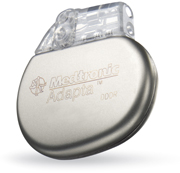 Wireless-enabled implantable devices enable care providers to check-in on a pacemaker's battery levels or how well an infusion pump is functioning, which means care providers can take action to prevent and harm to the patient. Of course that connectivity -- that feedback loop -- could also be used by hackers as a way to hurt people. "Could be" but, according to the Boston Globe, there's never been a documented case of that. Still, concerns remain.
Wireless-enabled implantable devices enable care providers to check-in on a pacemaker's battery levels or how well an infusion pump is functioning, which means care providers can take action to prevent and harm to the patient. Of course that connectivity -- that feedback loop -- could also be used by hackers as a way to hurt people. "Could be" but, according to the Boston Globe, there's never been a documented case of that. Still, concerns remain.
“These devices do increase the effectiveness of patient care,’’ Kevin Fu, a director of the Medical Device Security Center, and assistant professor of computer science at UMass, told the Boston Globe. “The two main risks are access to private information and control of the device. Security and privacy have much room to improve for medical devices.’’
The Medical Device Security Center is a collaboration of specialists from the University of Massachusetts Amherst, the University of Washington, and Beth Israel Deaconess Medical Center, according to the Globe report.
While there has been no accounts of hackers accessing implanted medical devices, Fu's team and others like it have demonstrated that possibility while conducting tests in their labs. Medtronic, one of the top makers of implanted medical devices, and a newly announced partner of the West Wireless Health Institute, said its products already have safeguards in place to protect against such manipulations.
“At present, we believe the risk of deliberate, malicious, or unauthorized manipulation of an implantable device is extremely low,’’ Medtronic told the Globe in a statement. “Medtronic would welcome the opportunity to work with the FDA, health care practitioners, and other medical device manufacturers to define and establish formal device security guidelines.’’
The FDA, however, said that security issues are outside of its domain, unless, of course, the security issues themselves might hurt the patient or alter the resulting clinical data.















